BANGKOK, January 2021: A Thai children’s song titled, ‘Chang’, (Elephant) is probably the very first song most Thai parents sing to their kids as they teach them how to sing, (see you tube). The lyrics ask if the child has ever seen an elephant. Then they go on to describe the elephant’s physical features such as tusks and trunk as it explains the attributes of this magnificent giant of an animal.
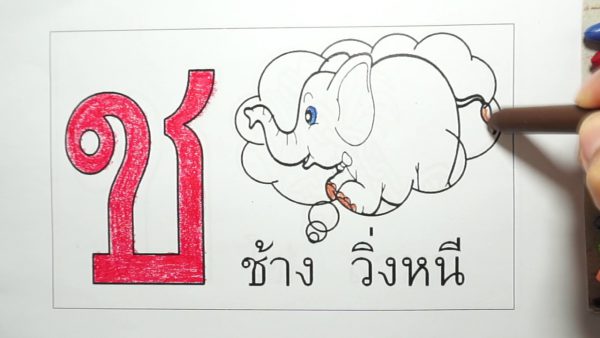
The country’s most loved animal has a deep bond with Thai social and cultural roots evident in ancient history. The enduring relationship between humans and elephants can be spotted in Thai daily life events today.
At the kindergarten, children are taught the Thai alphabet by pairing the different sounds to different objects. The 10th letter in the Thai alphabet is Cho Chang [ช], representing a ‘ch’ sound paired to the word ‘Chang’ to help children memorise the letter. Chang is also a common Thai nickname.
Historical records show that elephants in Thailand have been domesticated since the Sukhothai Kingdom dating back to the 13th century and are commonly referred to as a symbol of power. They were used to transport royalty on special occasions. The image of a white elephant was first featured on the Royal Naval Flag dating back to 1817 during the reign of King Rama II. In 1851, King Rama IV designated the white elephant emblem as the national flag. Beyond the auspicious symbolism linked to the royal institution, the elephant is portrayed in Buddhism traditions and history. Images of elephant king named PhyaChattan, one of the Buddha’s incarnations before being born as Siddhartha, are featured on murals in many Thai temples. Also, through the influence of Hinduism, statues of elephants are commonly found in spirit houses in household gardens. Images of elephants also appear on some banknotes and as part of the logo of the Bangkok Metropolitan Administration. The Thai government also declared the 13th of March as Thai National Elephant Day to revive and strengthen the cultural interest and connection with elephants that dates back centuries.
But the world has dramatically changed for the Thai elephant in captivity as visitors question welfare practices, circus tricks and look for a more meaningful experience to replace the out-of-favour elephant rides.
In the real world, beyond the ancient symbolism, there are signs that the wild elephant population is regrouping and expanding once more in protected national parks where conservation measures have improved. Wild elephants can be spotted in 69 National Parks across the country, according to the Department of National Parks, Wildlife and Plant Conservation The population nationally stands at around 3,500, with the biggest concentration in the western forest reserves of Khao Yai-Dong Phayayen, PhuKhieo – Nam Nao and Kaeng Krachan.
Meanwhile, the captive elephant population registered with the Department of Livestock Development stands at around 3,700. The welfare of the domestic elephant is being revisited. As practices come under review, the domestic elephant’s role also needs to adapt to a kinder version of tourism that encourages visitors to interact with the elephant and understand its daily life and needs.
Both wild and domestic elephants are protected. The country adopted a law to preserve wild elephants back in the early 1900s after logging was banned, and today, stakeholders are working together to improve laws to protect domesticated elephants and improve their welfare. A new animal welfare law and a ‘National Elephant Care Master Plan’ have been drafted and is now awaiting government approval.
Captive elephants require constant human care to survive. This is evident in the emerging elephant care trend in tourism that promotes a clearer understanding of the bond between elephants and humans and illustrates how they rely on each other. In Thailand, there are elephant conservation parks where visitors can observe the interaction between humans and elephants and learn how these majestic animals are treated with care, love, and respect. There has been a major shift in emphasis over the years from elephants entertaining us to an educational and inspirational experience that explores the bond between humans and elephants. Here are examples of parks that provide an environment that delivers a meaningful and rewarding experience for visitors that will enrich their understanding of Thailand’s elephants.
The Thai Elephant Conservation Center (TECC) in Lampang
Founded in 1993 under Royal Patronage, the government-funded elephant conservation offers choices of experiences which encourage visitors to fall in love with elephants. Activities include Elephant Educational Demonstrations that showcase the intelligence and strength of elephants and Elephant Bathing. Visitors can take part by helping the mahouts give the elephants a good scrubbing as they soak and cool down in the river. The centre also demonstrates how elephant dung can be used to make paper products or organic fertiliser. The centre is located on Km28-29 on Lampang-Chiang Mai Highway.
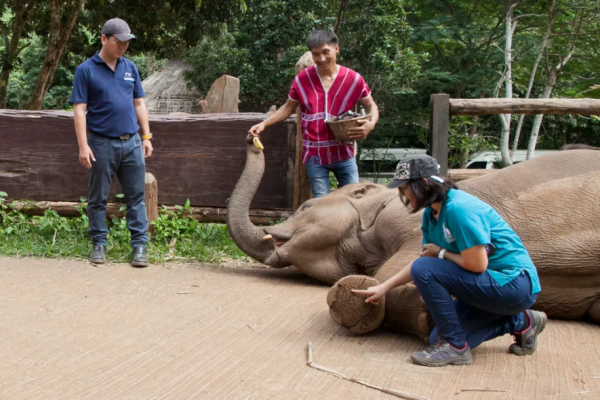
Kanta Elephant Sanctuary in Chiang Mai
Kanta Elephant Sanctuary is a retirement home for elephants that previously worked in entertainment shows or the logging industry. The sanctuary’s mission is to provide elephants with good health and freedom. Visitors are encouraged to feed, walk with, and observe the elephants as they roam around in the wild open space. At the sanctuary, there’s no training hooks, no ankle chains, and also no riding. Half-day or full-day programmes offer a chance to know each of the remarkable elephants, gain an insight into their history and understand their daily lives and behaviour. Kanta Elephant Sanctuary is located in Mae Taeng District, 50 km from Mueang Chiang Mai District.
Patara Elephant Farm in Chiang Mai
Based on conservation philosophy “Extinction is Forever”, Patara Elephant Farm encourages people to try to experience this special and sacred animal that should be treasured at least once in their lives. “Elephant Owner for a Day” is a special programme that Patara Elephant Farm created for visitors to learn and interact with elephants as if they are the mahout for a day. The hands-on experiences include how to participate, sharing responsibilities and taking care of an elephant. A unique “elephant caregiver for a day” is a personalised programme that will help visitors to understand the present living conditions of Thai elephants and how we can save them. Patara’s “Baby Elephant For A Day” emphasises the care of pregnant elephants and mothers with baby elephants. The programme does not include riding any elephants. Patara Elephant Farm is located in Tambon Baan Pong, Amphoe Hang Dong, Chiang Mai,
Samui Elephant Sanctuary
Samui Elephant Sanctuary is the first ethical elephant sanctuary on Samui Island in South Thailand. The winner of the 12th Responsible Thailand Awards – Animal Welfare category – it offers tours that provide insights into the lifestyle of these majestic giants. There is an opportunity to feed elephants, walk with them, and observe them as they forage, socialise, and play in the mud pit. Here, human interaction is limited. Letting elephants simply be elephants means visitors can observe their daily life while obtaining some amazing photo opportunities. The sanctuary has two locations on Samui Island; the original site in Bophut opened in 2018, and Chaweng Noi that opened in 2020.
Kindred Spirit Elephant Sanctuary in Chiang Mai
Kindred Spirit Elephant Sanctuary is a foundation, established to bring as many elephants as possible back to their natural habitat while working on educating both the public and locals about elephant treatment and welfare in order to combat illegal and cruel practices. The sanctuary won the 12th Responsible Thailand Awards in Community-based Tourism with projects that provide an income for the local community. The sanctuary offers homestays for the volunteers to stay. The sanctuary offers the option of short-term and long-term visits, as well as volunteer programmes. Kindred Spirit Elephant Sanctuary is located in Baan Naklang, Highway 1263 Mae Suek, Mae Chaem District, Chiang Mai.



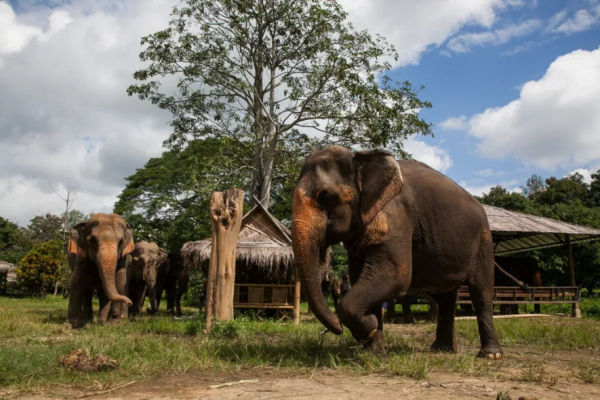
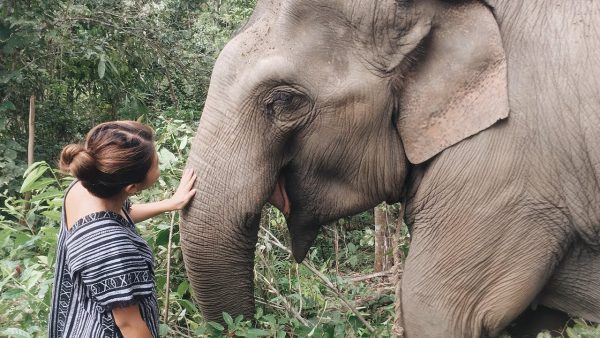
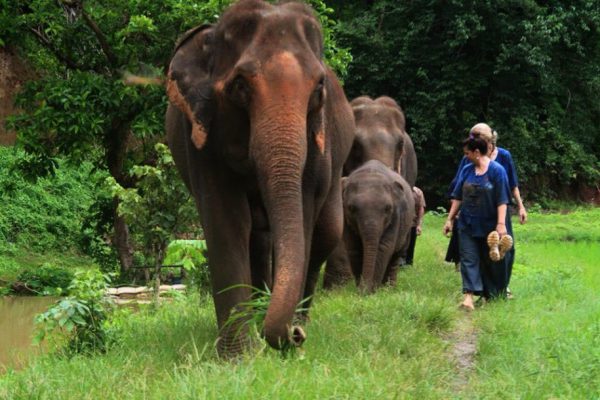





“Domestic elephant” is a misnomer – they are “captive” elephants. Elephants are not domesticated.
Elephants in Thailand should be kept in facilities by the government and have room to room and socialise as near as possible to nature – this should include a little interaction with humans on any level as possible.
Contrary to popular belief there is room for this in Thailand.
the population of captive elephants in Thailand should have dwindled with the cessation of logging – however tourism has made elephants a profitable commodity and through inappropriate breeding smuggling and capture from the wild the population has increased.
Thailand has more cap[tive elephants than the rest of Asia put together…..it is an industry founded on ignorance and abuse.